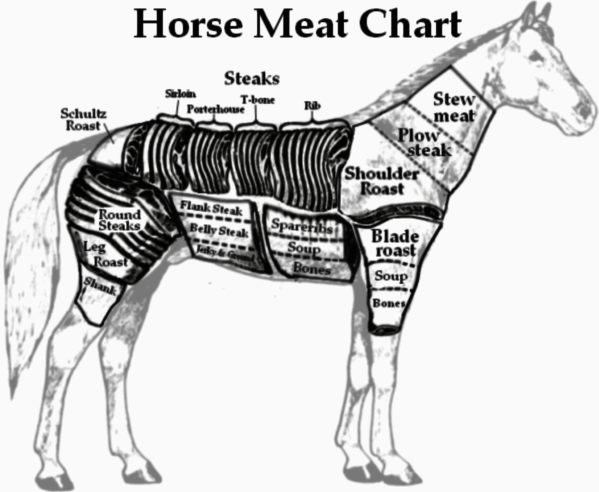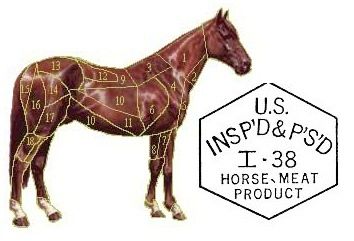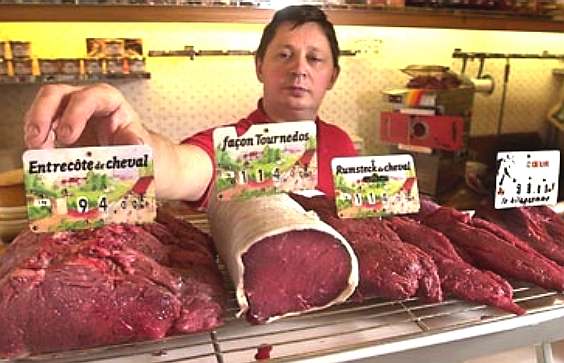
FARMING UK JAN 2009
Horses are processed in the exact same manner as cattle. There are 7 horse abattoirs in Canada licensed to export meat for human
consumption and 21 in Mexico.
So what goes on at the horse abattoir, Take a look- www.clay-meat.com is a typical horse meat export abattoir, as you will see
there is no difference to a beef or sheep abattoir.
PRODUCTION FIGURES
Mexico produces 78,000 tons a year
Argentina 57,000 tons a year
Kazakstan 55,000 tons a year
Mongolia 38,000 tons a year
Kygyzstan 25,000 tons a year
Australia 24,000 tons a year
Brazil 21,000 tons a year
Canada 18,000 tons a year
Poland 18,000 tons a year
Italy 16,000 tons a year ( including donkeys)
Romania 14,000 tons a year
Ukraine 13,000 tons a year
Chile 10,000 tons a year
France 7,500 tons a year
Uruguay 8,000 tons a year
Senegal 9,5000 tons a year
Colombia 6,000 tons a year
Spain 5,000 tons a year (including donkey)
There are no official figures for China and Russia however estimates are:
China 150,000 tons a year and Russia 80,000 tons a year, as they are mainly butchered in small abattoirs and on farms.
There must be something good about horse meat, for all these abattoirs to have such a high production.
Well of course it is high in protein and low in fat, however for commercial farming the horse cannot convert grass to meat at the same rate as cattle, there not a viable alternative.
The United States has 9 million horses compared with 90 million cattle, however the bigger the taboo the less chance of a commercial meat industry. While farmers are asked to pay a carbon emission tax on the 90 million cattle, who pays this on the 9 million horses, who emit more gas that cattle as any horse
rider will know.
Horse meat was very popular in Europe, but not eaten in English speaking countries to any large degree.
According to the Daily Mail in London, around 100,000
horses a year are transported and consumed in the European Union, while in England there are only three horse abattoirs who export to France and Belgium, the practice is still frowned on by the British.
Canada has a thriving horse meat industry, mainly due the default of the Americans and in Quebec it is available in many supermarkets.
Horse meat has slightly sweet taste, rather like a cross between beef and venison, the younger the
horse the more tender the meat as with beef and lamb.
When I reported recently that there are no abattoir in the United States, that slaughters
horse meat for human consumption, that has been the case since November 2008.
A good commercial horse will fetch around US$500 for the meat trade, time 9 million horses in the United States. This could be a multi billion dollar industry.

GORDON RAMSAY ON HORSE MEAT 2007
Gordon Ramsay is to shatter the last taboo of English cuisine by urging the public to eat horse meat.
The controversial chef claims horse meat is tasty and nutritious and should be part of the British diet.
But his call for horses, long revered as farm and racing animals, to be turned into dinner has sparked revulsion among horse lovers, animal welfare campaigners and vegetarians. Even hardened meat eaters and fellow chefs said it was a dish too far.
The celebrity cook found support from some chefs, who said the meat-eating British were too sentimental about horses and hypocritical because they were happy to eat cows, sheep and pigs. But even they doubted whether horse would become popular.
Ramsay reveals his horse meat stance in a new series of The F-word, which starts on Tuesday on Channel 4. The Scottish-born chef admits: "I've eaten horse", and says that it is healthy, with lots of iron and half the fat of beef and far more Omega 3 essential fatty acids. He describes horse meat as "slightly gamey" and "packed with protein".
For the programme, Ramsay, sends the presenter Janet Street-Porter to France to look at a horse farm and then to Cheltenham racecourse to cook horse on a barbecue and persuade punters to taste it.
She said: "In a world of mad cows, we should be opening our eyes to new types of red meat. Horse meat is a really good source of protein and one we should take seriously."
It is not illegal to eat horse meat in Britain and it was, in fact, consumed in some regions until the Thirties.
But Ramsay's one-time protégé Marcus Wareing, the chef patron at Petrus in London, said that he was appalled by the idea of serving horse meat.
"I would never eat horse and I certainly wouldn't serve it in my restaurants," he said. "It's not part of our food culture. It's absolutely unthinkable."
A spokesman for the Vegetarian Society said: "Most people will find eating horse abhorrent."
Clarissa Dickson Wright, one of television's Two Fat Ladies, was sympathetic but said horse meat simply wasn't tasty enough to catch on with the public.
"I have no objection to eating horse meat," she said. "But if it was good eating there would be more people eating it."

FARMERS GUARDIAN - NOV 15 2013
A HORSEMEAT market in the UK would not only help fulfil demand for red meat but also boost animal welfare as well, the Princess Royal has said.
Speaking at the World Horse Welfare charity conference in London yesterday (Thursday), Princess Anne, who is president of the organisation, said owners were more likely to take better care of their animals if they were eventually destined for supermarket shelves.
She said: “Our attitudes to the horsemeat trade and the value of horsemeat may have to change.”
The former eventer added there was a debate to be had around the subject.
“Should we be considering a real market for horsemeat and would that reduce the number of welfare cases if there was a real value in the horsemeat sector?
“I chuck that out for what it’s worth because I think it needs a debate.”
The horsemeat scandal earlier this year caused outrage in Britain and left consumers wary of retailers.
Farming chiefs called for tighter and ‘more transparent’ supply chains.
But Princess Anne said the furore was mainly caused by the mislabelling of products such as lasagne and meatballs which were sold as beef.
She said horsemeat in France is more expensive than any other meat and added value ‘has a part to play’ in reducing animal welfare cases.
HORSE
LAW IN THE UK
Under UK legislation, a horse is an agricultural animal if it is used to farm agricultural land or farmed for meat or hides.
Horses
can be kept for both agricultural and other business, but non-agricultural purposes - eg in livery stables.
Under the Animal Welfare Act 2006, the
well-being of all horses is protected by law. It is an offence to cause or allow unnecessary suffering and you have a duty to ensure the basic welfare needs of all horses under your ownership and responsibility by:
1. providing a suitable place to live, including housing with or apart from other animals
2. providing a suitable diet
3. protecting them from pain, injury, suffering and disease
4. making sure they exhibit normal behaviour
If the horse is used for an agricultural purpose, eg working the land, and/or is intended for meat or other by-product production, then the Welfare of Farmed Animals (England) 2007 (as amended) applies, with additional legislative requirements. However, this does not include horses used for producing pharmaceutical products such as antisera, where welfare is covered by the Animals (Scientific Procedures) Act 1986.
PLANNING
ENFORCEMENT - HORSES FOR RIDING
Watch out for
devious local council's who try to trick agricultural operations into
saying they are equestrian pursuits.
Many
agricultural landowners are unaware of the distinction between
agricultural use of land and equestrian use of land.
‘Agriculture’ is defined as: “horticulture, fruit growing, seed
growing, dairy farming, the breeding and keeping of livestock (including
any creature kept for the production of food, wool, skins or fur, or for
the purpose of its use in the farming of land) the use of land as grazing
land, meadow land, osier land, market gardens and nursery grounds and the
use of land for woodlands where that use is ancillary to the farming of
land for other agricultural purposes.”
The
only equestrian “use” that falls within the agricultural definition
is:- producing horses for slaughter, working horses on the land (e.g.
ploughing with horses which is a rare sight today), and turning horses out
for grazing only.
The
most common form of agricultural equine use is grazing horses on land.
However, as soon as more is being done to the horses than merely grazing,
for example additional feeding on the land, rugging the horses and/or
riding them on the land, use falls within “equestrian use.” The
landowner must then apply to his/her local planning department for a
change of use from agriculture to equestrian.
Landowners
face enforcement action for unlawful equestrian use for a variety of
reasons such as allowing agricultural buildings on their farms to be
used for keeping horses and turning horses out on agricultural land
with additional feed, rugging and riding on the land.
Enforcement action focuses on returning the land and buildings to their
original state, which can be tricky if a landowner has agreed a formal
written lease with an equestrian tenant for such use! The costs in a legal
case can be astronomical as Natural
England and Council's will build the
costs deliberately so as to use financial as well as injunctive relief to
obtain land at an undervalue.
YOUTUBE
LINKS
http://www.independent.co.uk/the-real-scandal-behind-horsemeat-is-the-struggle-of-smallholding-british-farmers
http://www.farmersguardian.com/home/business/princess-anne-calls-for-uk-horsemeat-market/60182.article
http://www.equinerescuefrance.org/campaigns-2/horsemeat-in-france/
https://www.gov.uk/keeping-horses-on-farms
http://www.telegraph.co.uk/news/uknews/1550742/We-should-eat-horse-meat-says-Ramsay.html
http://www.farminguk.com/news/Argentina-Horse-Meat-world-production-figures._10249.html
http://www.fwi.co.uk/business/horsemeat-scandal/
http://www.agriblog.co.uk/?p=102


